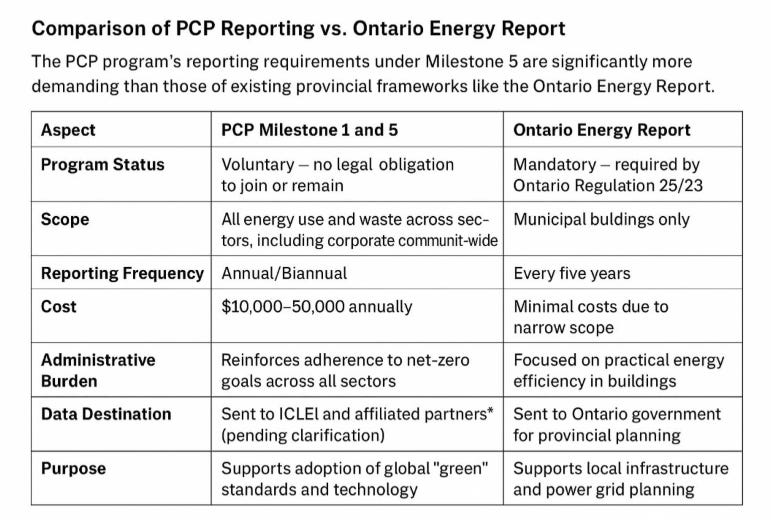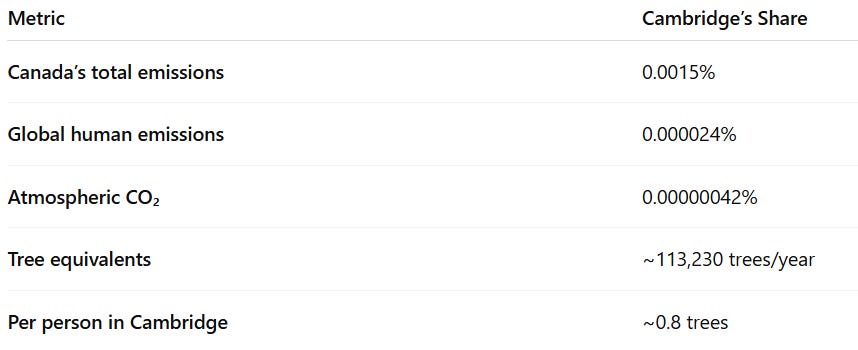Blurring the Lines: How PCP and Provincial Requirements Are Being Misrepresented in Local Climate Reporting
When voluntary global targets are disguised as local obligations, taxpayers pay the price.
Cambridge City Council’s recent ECDM report revealed a concerning trend unfolding across municipalities nationwide: the increasing conflation of voluntary climate programs like the Partners for Climate Protection (PCP) with provincially mandated reporting. These are not the same. And unless councillors draw a firm line, councils risk committing to costly climate plans under the false impression that they are required by law.
A Wake-Up Call in Cambridge
On September 23rd, resident Peter Hyman delivered a principled delegation to Cambridge City Council during its review of the 2025–2029 Energy Conservation and Demand Management (ECDM) Plan. He made it clear: the PCP is voluntary, and the provincial energy report does not require net-zero timelines or carbon credits.
Yet the ECDM plan presented to Council blended PCP goals and provincial reporting obligations into a single narrative, misleading both councillors and the public.
Thankfully, three councillors voted against even receiving the report, citing concerns over costs, questionable benefits, and the prioritization of federal benchmarks over local needs and municipal interests.
“Are we allocating limited local resources to serve our residents—or to fulfill global benchmarks that were never debated or consented to by the people of Cambridge?” – Peter Hyman, Delegation to Council
The False Equivalence
Here’s what Ontario actually requires:
Municipalities must publish an ECDM Plan tracking energy use in facilities every five years.
There is no requirement for netzero targets, milestone tracking, or carbon credit purchases.
Here’s what the PCP program introduces:
Extensive data and milestone reporting (Milestones 1–5)
Voluntary but expensive GHG targets: 30% by 2030, 50% by 2040, and 80% by 2050
Undisclosed, yet apparently assumed purchase of carbon offsets or credits to close any gap in targets!
Nowhere in the PCP documentation or in any council motion has there been explicit direction to commit to purchasing offsets—yet the ECDM plan quietly implies that this is expected and should be concidered going into budget season.
How Much Does PCP-Driven Emissions Reduction Actually Cost?
The ECDM Plan outlines two ambitious emissions reduction milestones: 30% by 2030 and 80% by 2050 (compared to 2010 levels). However, these targets rely heavily on expensive infrastructure changes and carbon offset purchases not required under provincial law. Here’s what the city’s own report and estimates show:
2030 Target – 50% Emissions Reduction
Additional reduction needed: ~4,355 tCO₂e (from 2025 levels)
Estimated cost (2025–2030): $15 million – $25 million
Cost per tonne: $3,400 – $5,700 / tCO₂e
2050 Target – 80% Emissions Reduction
Remaining reduction needed (likely via offsets): ~6,968 tCO₂e
Estimated cost (2025–2050): $34.1 million – $59.3 million
Cost per tonne: $4,900 – $8,500 / tCO₂e
These costs are 20 to 50 times higher than the federal carbon tax, which is capped at $170 per tonne by 2030. And yet, there is no clear evidence that these expenditures would result in measurable global climate impact.
What Do We Get for $60 Million?
Let’s put Cambridge’s projected 2050 emissions (8,710 tCO₂e) in perspective:
This raises a serious question of proportionality:
“How will spending tens of millions of dollars do anything in terms of emission reduction other than make it more expensive for the general public?”
—Councillor Schwar, September 23 Council Meeting
Meanwhile, pressing local issues remain:
Flood mitigation along the Grand River
Road and infrastructure maintenance
Affordable housing and downtown revitalization
Councils: Beware of This Playbook
Municipalities across Canada are now being quietly nudged into:
Signing onto voluntary frameworks (PCP, CAP, UNSDGs)
Embedding unreasonable targets into local plans and budgets
Purchasing offsets or “green” credits
All under the false pretense that this is required.
Let’s be clear: It’s not.
If councils don’t pause, ask questions, and assert their jurisdictional rights, they may find themselves on the hook for decades of payments to external vendors, foreign utilities, or carbon brokers—while local infrastructure and services are starved.
Four Actions Every Council Should Consider:
Re-examine all PCP-related obligations: Are they optional?
Separate provincial compliance from voluntary targets in all reporting.
Request a full cost accounting of all climate-related plans and programs.
Consider non-renewal of PCP membership if full program transparency and cost-benefit standards are not met.
In Conclusion
KICLEI Canada supports common-sense environmental stewardship. But that must be rooted in local autonomy, fiscal accountability, and clear democratic consent.
No municipality should be tricked into transferring millions of public dollars to serve global carbon accounting schemes. Let this be a warning, and a call to action.
New Municipal Toolkit Unveiled: Time to Fact-Check the “PCP Is Free” Claim
For over a year, residents across Canada have been told the same thing:





